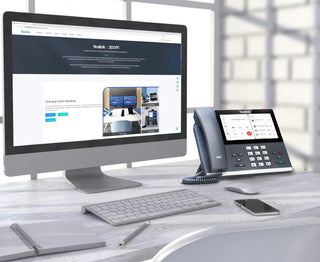The concept of “IP phone” has been in our lives for a very long time. In fact, according to research, more than 80% of businesses in the US use this phone. We will try to eliminate the question marks in the minds about this technology. The businesses among us who still use old landline phones, maybe they will start using IP Phones after reading this article.
What is IP Phone?
It refers to any phone system that uses an internet connection to send and receive voice data. VoIP phones work by reading an individual's analog audio signals and converting them to digital signals. These converted digital signals are then sent to a broad line as data. In simpler words, it works by taking phone conversations and routing them over a network cable to the network and then out and to the internet over an IP phone system, also known as a VoIP system. Unlike a regular phone that uses landlines to transmit analog signals, IP phones connect to the internet via a router and modem.
How Do IP Phones Work?
IP phones work by reading an individual's analog audio signals and converting them to digital signals. These converted digital signals are then sent to a broad line as data. In simpler words, IP phones work by taking phone conversations and routing them over a network cable to the network and then out and to the internet over an IP phone system, also known as a VoIP system. If you use an IP PBX system, data is transferred digitally over the local area network (LAN) and then converted to analog voice signals and sent to the PSTN (Classic Copper cable transmitted telephone network).
What are the Differences of IP Phones from Fixed Phones?
After migrating to an IP phone system, your old landline phones will no longer work and will need to be replaced with IP phones (unless you decide to use ATA adapters). From the outside, IP phones and analog phones are indistinguishable to the average person and provide the same functionality.
The advantage is that these digital signals can be transmitted anywhere over the internet using nothing more than your regular internet connection, thus bypassing the cables and therefore the charges imposed by telephone companies. In addition to this huge expense, you will have a better understanding of what these phones have to offer later in the article.
Advantages of IP Phones for Business
Up to 60% Cheaper than Landlines
If a business wants to update its phone system and save costs in the long run, an IP phone network is the best option. It uses the internet to make and receive calls, which means you don't have to invest in copper cables to carry analog signals throughout the office. You can use the existing internet connection in your office to connect your phones. Moreover, users can make free calls to other IP phones in the organization.
More Features Without Extra Hardware
Especially with Yealink 's wide IP Phone Product Range, you can establish a better quality communication with more affordable costs in your small-medium-large businesses and you can level up your business with many features besides the following features.
For example:
» Advanced Call Forwarding
» Automatic switchboard
» Queue incoming calls
» Call History
» Statistics Record
" Video call
Unlimited Simultaneous Calls
On a traditional landline phone, if you want to make a call while on another call on the same phone, you will need a different number to make the second call, also known as a "rollover line". With a cloud phone system, the need for rollover lines (and the extra cost per line) is eliminated. Cloud phone systems provide unlimited simultaneous calls and eliminate rollover lines.


